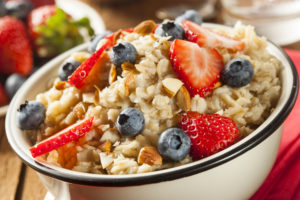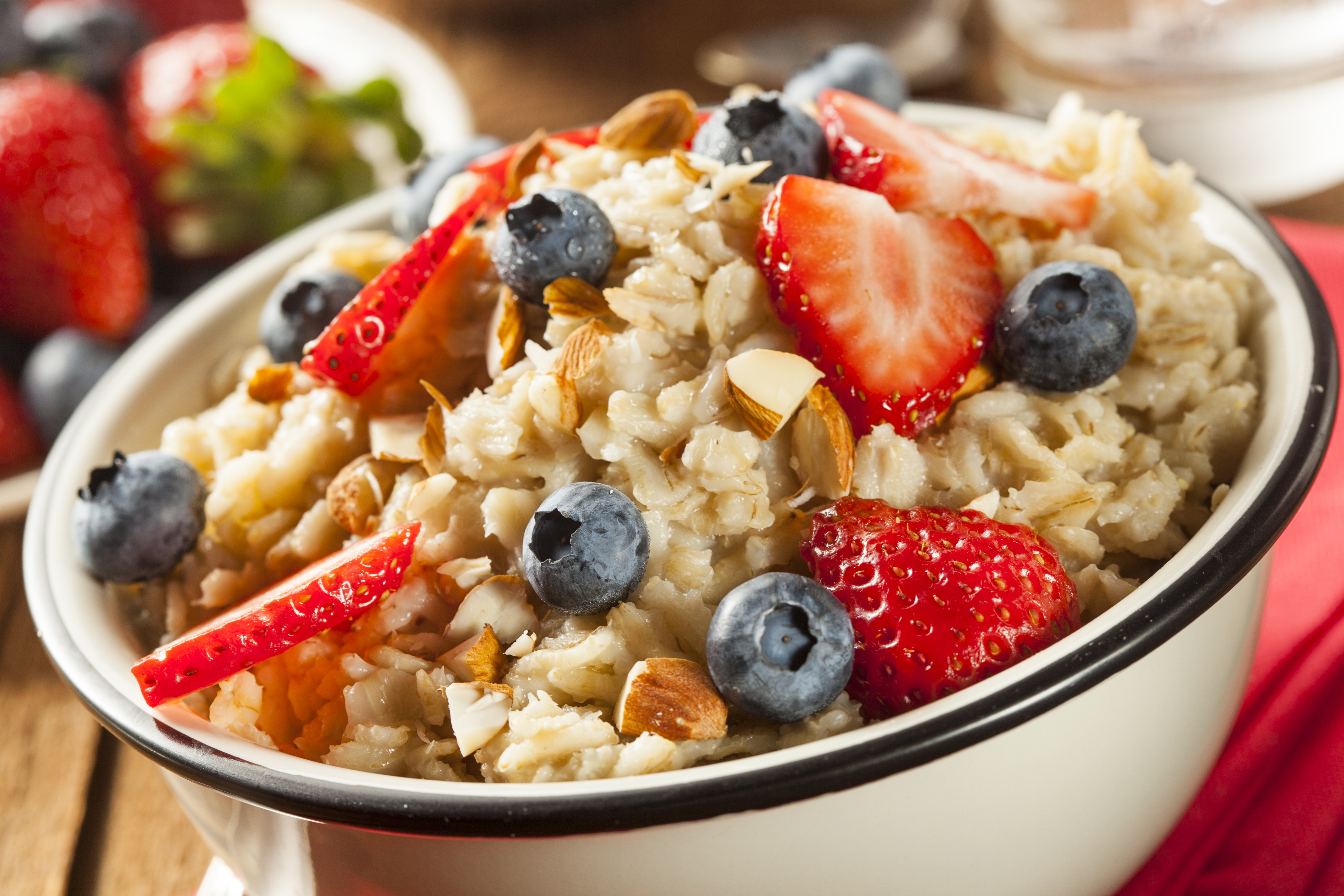
Food plays a significant role in managing your heart health and in altering levels of cholesterol in our body. Poor eating habits, coupled with a lack of exercise, can result in weight gain or obesity. Additionally, choosing unhealthy types of food can raise levels of the ‘bad cholesterol’ (technically called the Low-density lipoprotein or LDL cholesterol). This can negatively impact your heart health.
A balance should be key to help you eat your way to healthier cholesterol levels, and of course, a healthier heart. Studies show that these 17 superfoods will help you reduce the harmful types of fat in your body, and aid you towards becoming more fit and healthy. Here they are:
Oats for breakfast. Oats will provide you a healthy breakfast to start your day with a boost. This high-fiber food is not only filling but full of soluble fiber that can reduce the absorption of harmful cholesterol into your bloodstream.
- Oats contain a special natural type of soluble fiber called beta-glucan. Eating about 3 grams of beta-glucan a day helps lessen cholesterol reabsorption.
- Beta-glucan dissolves in your digestive tract, forming a thick gel that binds to excess cholesterol. The combination of gel and cholesterol will be excreted as waste, instead of being absorbed back into the body.
- Legumes for lunch. Baked beans, lentils and chickpeas are great sources of soluble fiber. For a tasty lunch, why not throw together broad bean salad with faro or a beef burrito bowl with smokey bean? You can have this tasty meal with red kidney beans.
- Also try combining nutritious legumes with veggies for an extra boost.
- Beans are very high in fiber. They are proven to lower cholesterol, and are major protein sources for various populations worldwide, for centuries.
- Dry beans such as lentils, black beans, kidney beans, and navy beans are high in soluble fiber, plant-based proteins, and phytonutrients that act to reduce cholesterol. In part, this is done as it displaces other types of protein such as red meat, which is high in saturated fat.
- Fish and whole grains for dinner. Foods containing healthier unsaturated fats can lower your harmful cholesterol. These include fish, a known rich source of omega 3.
- Cold-water fish like tuna, trout, sardines, salmon, and mackerel are full of omega 3 fatty acids. Important: In certain cases, such as for pregnant or nursing women as well as children, consumption of these fish should be limited as these can be high in mercury.
- You can add more value to your dinner by adding whole grains to your fish diet.
- Omega 3 fatty acids are known to significantly reduce the risk of death by heart disease. It also inhibits the production of very low-density lipoprotein (VLDL) in the liver. VLDL is the type of cholesterol that carries triglycerides to body tissues. This translates to a greater risk for metabolic syndrome, obesity, type 2 diabetes, and heart problems.
- Fruit-filled goodness for dessert. Berries, apples, and citrus fruits contain pectin, which is a type of soluble fiber that can work wonders to your bad cholesterol levels.
- Apples contain good amounts of soluble and insoluble fiber, such as pectin, which helps lower LDL cholesterol. Eating a large apple a day, in fact, can lower cholesterol levels by about 10%.
- Apples also contain quercetin, a flavonoid, that is proven to reduce the risk of heart disease through antioxidant and anti-inflammatory activity.
- Blueberries, especially the wild berries, are on top of lists for the healthiest foods on the planet. In fact, studies show that blueberries lower cholesterol better than the popular statin drugs! Adding a cup of blueberries to your diet should significantly improve your health.
- You can try other delightful ideas for dessert, including a fruit crumble or apple cinnamon crepes that should contain the fiber-filled goodness of both oats and fruits.
- Seeds and nuts. For snacks, seeds and nuts are a rich source of cholesterol-lowering unsaturated fats. A handful of these in between meals can keep you feeling full for longer.
- Studies show that the regular consumption of seeds and nuts is linked to lower LDL, the ‘bad’ cholesterol levels.
- Almonds, hazelnuts, and walnuts are a powerful weapon in fighting heart disease.
- Flaxseed is high in omega 3 fatty acid, linoleic acid, and antioxidants, which lower total cholesterol and LDL cholesterol levels. You can sprinkle it on ice cream or yogurt, or add the whole seed to baked goods. You can also use as flaxseed oil for salad dressings, sauces, and dips.
- Sesame seeds are high in the antioxidant lignan. Evidence shows that this antioxidant lowers cholesterol and reduces blood pressure. Store these seeds in tightly covered containers, and store them in the refrigerator, as they can go rancid easily.
- The healthier oils. If you’re using butter or other animal-based fats for oil, it’s time to switch to the healthier types of fruit, seed, or nut-based spreads and oils. The healthier oils include olive, canola, or sunflower.
- The healthy proteins. Enjoying a variety of healthy proteins such as dairy products with reduced-fat and lean cuts of meat can help keep your harmful cholesterol down. Also, this should keep your heart health up.
- Dark leafy greens. Veggies are so good for you. The dark green leafy varieties are very high in vitamin C, as well as the other essential vitamins and minerals. It contains calcium, lutein, and especially fiber, which can aid in lowering elevated cholesterol.
- The best greens include turnip greens, mustard greens, kale, Swiss chard, and romaine lettuce.
- Bread and cereals. Healthy bread and cereals, as well certain enhanced margarine contain plant sterols and stanols which are proven to aid in cholesterol management.
- People at risk for heart disease especially individuals with high LDL cholesterol in the blood will benefit from consuming rich sources of plant sterols found in bread, cereals, vegetable oils, fruits, vegetables, as well legumes, nuts, and seeds.
- When eaten in adequate amounts, plant sterols and stanols have shown to lower LDL cholesterol by 10-15%, in combination with a healthy lifestyle.
- Be sure that the margarine fortified with plant sterols you choose says it can be used in baking before trying it in cookies, cakes or bread.
- Stir a smoothie. Whey protein, an isolate component of milk, is high in protein, lactose-free, and nearly cholesterol-free. It reduces high blood pressure and lowers elevated LDL cholesterol.
- You can stir whey protein into a smoothie, add a spoonful to bread dough or a muffin, or add it to hot cocoa.
- Treat yourself with raisins. This chewy and sweet fruit that children love is a good ally in fighting the bad cholesterol. Studies have shown that consuming raisins daily significantly helps lower cholesterol levels.
- Eating just 3 oz. of raisins daily results to a statistically significant reduction in total cholesterol and LDL cholesterol.
- The benefits of soybeans. Soybeans contain protein that has a beneficial impact on high cholesterol levels. It has been studied that eating two servings of soy milk, tofu, or soybeans each day effectively reduces cholesterol levels by up to five percent.
- Additionally, soybeans contain lecithins, isoflavones, saponins, and fiber that improve heart health. Isoflavones, specifically, lower blood pressure. Saponins, inhibit the absorption of cholesterol into your body cells.
-
- Let’s talk juice. Orange juice, apart from being an excellent source of vitamin C, also contains phytosterols. These plant sterols positively influence cholesterol levels. They inhibit the absorption of cholesterol in the diet, and assists in lowering concentrations of the LDL ‘bad cholesterol’ in the blood.
- The advantages of avocado. Avocado is an excellent source of phytosterols, polyphenols, and monounsaturated fats, which are all vital in improving cholesterol levels. By replacing saturated fats with avocado or avocado oil, bad cholesterol can drop by up to 15%.
Supplements and Herbs
Here are some supplements and herbs that lower LDL cholesterol:
- Niacin, also known as vitamin B3, lowers harmful cholesterol. It has been proven to significantly lower triglycerides and LDL cholesterol. It also lowers lipoproteins, which is another risk factor for atherosclerosis. Atherosclerosis is a disease where substances such as cholesterol, fat, calcium, and other substances harden and narrow the blood vessels. In effect, blood is not able to flow efficiently.
- Artichoke leaf. Research suggests that the artichoke leaf extract can help lower cholesterol. In particular, this happens as it limits the synthesis of cholesterol in the body. Artichokes also contain cynarine, a compound which is believed to increase the production of bile in the liver. The flow of bile from the gall bladder is hastened. Both these mechanisms increase bad cholesterol excretion
- Amaranth, the healthy grain. This healthful whole grain can be used in many types of cereals, bread, and snack foods. It has been used for centuries by the Aztecs and Incans in their food to sustain health. Although it is commonly referred to as “pseudo-cereal,” and is classified as a grain, amaranth has protein content that is as high as that in lentils and beans.
- The use of amaranth has been popular to positively influence a variety of health conditions, including high blood pressure, diabetes, obesity, and heart conditions.
- Indulge in dark chocolate. If you have high cholesterol, indulging in a delicious, organic, dark chocolate can be a treat that has shown to lower cholesterol in reliable clinical trials. Hence, it should be beneficial to reward yourself some dark chocolate after eating a healthy diet, reaching your exercise goals, and losing weight.
- Dark chocolate contains more cocoa than other forms of palatable chocolate products. It has higher amounts of flavonoids that have been proven to exert a protective effect against heart conditions.
- To make the most of lowering your cholesterol by adding dark chocolate to your diet, choose products with high-cocoa content, and the least amount of processing. Too much processing can lower the flavonoid content.
Finally, although many foods help combat elevated cholesterol, it’s not enough to just eat low-fat foods or even the foods that lower cholesterol. The ideal health program for you should involve activities other than your diet that will reduce or maintain your weight to optimal levels, fight inflammation, and remove cholesterol from your bloodstream.
Choosing a healthy diet and lifestyle will make you look and feel better. Your health will improve, no matter how unfit you are at the start. It should take just basic knowledge, some effort, and sufficient determination to change your eating habits and lifestyle.
